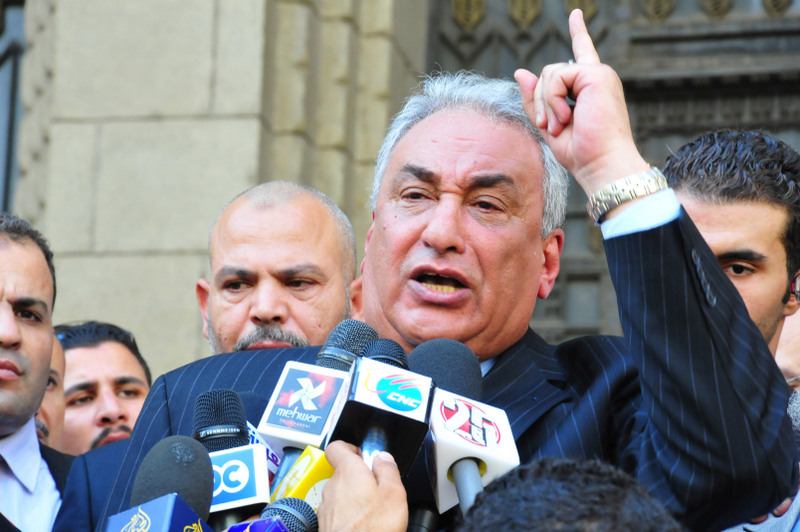
Egyptian Minister of Foreign Affairs Nabil Fahmy met with Secretary of State John Kerry on Tuesday in Washington, DC during the former’s first official diplomatic visit to the United States.
“Egypt has been going through a very difficult transition process. What happens in the next weeks and months is very important to all of us,” said Kerry in a media appearance with Fahmy before their Monday meeting.
“There have been disturbing decisions within the judicial process that have raised serious challenges for all of us,” added Kerry, who said that he and Fahmy would “candidly and forthrightly” discuss the issue in “spirit that wants to find a way for Egypt to make it through transition.”
Kerry highlighted the new constitution as a “positive step forward” and that the Egyptian government needed to adopt an approach that embraced “action not words” when it came to the country’s transition leading up to elections.
During a Monday meeting with members of the US House of Representatives Foreign Affairs Committee, Fahmy highlighted various developments in Egypt since last summer, including the ratification of a new constitution and ongoing preparations for presidential and parliamentary elections. He also told the US lawmakers that the Egyptian government was confronting terrorism “within the framework of the law” and undertaking efforts to attract foreign investment and create jobs.
A statement issued by the Ministry of Foreign Affairs said that the Egyptian minister also discussed other internal developments with members of US Congress, including judicial rulings, stressing the “importance of respecting the principle of the separation of powers and noninterference in the affairs of the judiciary”.
They also discussed bilateral relations and certain regional developments, including Palestine, Libya and Syria.
The diplomat also discussed developing Russia-Egypt relations, saying that it was in Egypt’s interest to maintain “strategic relations with the United States, while simultaneously adding new partners through the diversification of alternatives”.
Department of States spokeswoman Jen Psaki said that Kerry would use his time with Fahmy for “face-to-face diplomacy”.
“He’ll certainly talk about our ongoing commitment to a long-term relationship with Egypt, but also raise concerns about recent events,” she said, specifically mentioning the mass death sentence handed down by a Minya court on Monday and the ruling banning the activities of the 6 April Youth Movement.
“We urge the government to demonstrate, through actions rather than words, its support for the universal human rights and democratic, accountable governance that the Egyptian people continue to demand,” she added.
Fahmy said that Egypt and the United States would begin establishing a relationship with a “new and firmer foundation” during an address on Tuesday at the Center for Strategic and International Studies in Washington, DC.
“Even before 2011 the relationship suffered from complacency and even stagnation at some points in time,” Fahmy stated. The reformulating of relations would require “honest, conception conversation between both sides,” he said, adding that a return of healthy Egypt-US relations would require efforts beyond his visit to the US capital.
“Lately difference not so much over policy, but a fundamental divergence and popular narrative on both sides,” said Fahmy regarding ties between Washington and Cairo. “In US, the perception seemed to be that it was a political crisis that could be resolved by political means,” he said concerning former president Mohamed Morsi’s ouster and its aftermath. Egyptians, he said, saw it as an “existential struggle over the identity of Egypt as a people, nature of people as a society and future of Egypt as a nation”.
“Terrorism only reinforced the existential struggle,” he added, “a reality that has eluded many in the West.”
“It is in the interest of both countries to renew the strategic rationale of the Egyptian-American relationship that seems to have gone adrift in years past,” said Fahmy.
“We both want a Middle East that is modern, moderate, democratic and pluralistic.”
The Egyptian foreign minister also reiterated the nature of developments with Russia. “Our emerging relationship with Russia is one that we will seek to nurture and leverage, not only for the benefit it brings to Egyptians and Russians but also for the cause of regional peace and security,” he said.
Fahmy also stressed that Egypt would “maintain and enhance” its strategic relationship with Western Europe.
Congress passed a bill in January allocating $1.3bn in military aid to Egypt under certain conditions. The first installment, worth $975m, was dependent on Egypt holding a referendum on a new constitution and showing it is “taking steps to support a democratic transition”. The second installment, worth $576.8m, can be approved following the occurrence of parliamentary and presidential elections.
Stipulations set for the entire aid package outlined that Egypt must maintain its strategic relationship with the US and fulfill its obligations under the peace treaty with Israel.






